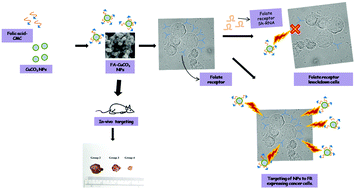Targeted delivery of “copper carbonate” nanoparticles to cancer cells in vivo†
Abstract
Various metal based nanoparticles such as Zn, Co and Cu are well known to have an anticancer effect. In targeting these nanoparticles, it is a great challenge to minimize the toxicity to normal cells. Folate receptors are expressed in a variety of cancer cells. Folic acid mediated targeting is a well accepted technique for cancer therapeutics. The purpose of this study is to explore the effect of novel copper carbonate (CuCO3) nanoparticles and their targeted delivery to cancer cells in vitro and in vivo. We synthesized the CuCO3 nanoparticles by a precipitation method, and they were characterized using various biophysical techniques. These CuCO3 nanoparticles (18–20 nm) induced DNA damage and disrupted the mitochondrial membrane, and finally cell death was mediated by apoptosis. Additionally, folic acid was conjugated to the CuCO3 nanoparticles, to deliver them specifically to cancer cells. To study the efficacy of the targeting, folate receptor knockdown HeLa cells were developed by sh-RNA and it was also further tested on a mouse model. These folic acid conjugated CuCO3 nanoparticles can be an effective therapeutic agent for folate receptor expressing cancer cells, and can therefore minimize the toxicity to normal cells.


 Please wait while we load your content...
Please wait while we load your content...